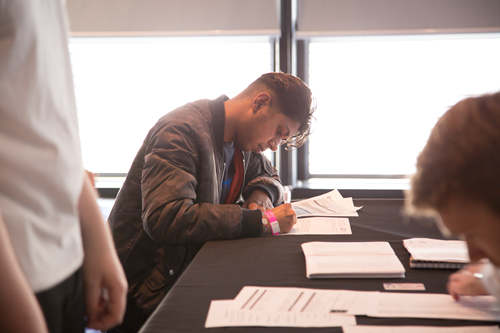The first step for all applicants is to decide on the course you would like to study. After all, you’ll be spending three years or more doing it. UCFB provides detail on each degree programme, taking an in-depth look at entry requirements, modules and career prospects. Make sure to look at each degree page to find out which of our campuses your chosen course is available at.
All applications to full-time undergraduate programmes at UCFB are made through the ucas.com application system using the UCAS codes that can be found here.

When you first apply through UCAS you are generally given up to five choices to use initially and you are free to use these choices however you wish. Some applicants like to apply to one course at a number of different institutions and decide where in the country they may like to live, others have already decided they would like to study at UCFB and apply for a number of different courses with us.
It is important that whatever you choose to do, your decision is well informed and carefully considered. You should make an effort to investigate and research all of the subjects and institutions you are interested in by visiting the campuses and faculties, meeting academics and asking questions about the opportunities and employability that the subjects, courses and institutions can offer. Once you have made your first five choices on UCAS you only have 14 days to change your mind, so it’s important that you do not waste any of your choices.
Apply via UCAS
Applications must always be done through the UCAS website. The single application fee will no longer be available so the fee for all 2024 undergraduate applications will be £27.50.

The UCAS application allows you to upload a list of your current qualifications as well as any you will be sitting prior to enrolment, you can also upload a personal statement and have a reference written for you to support your application. It’s important that you fill in this form in full, leaving no information out and with a full personal statement and appropriate reference. This one form will be sent to every course and institution you apply for and is often the most important first impression that you make with an institution.
UCAS set key dates and deadlines throughout the year which applicants and institutions must meet in order to ensure that your application is not left open and in limbo for too long. It’s important that you keep a close eye on UCAS and your emails as sometimes you will have a deadline to respond that could lead to you losing your offers if you miss it.
January 31st – entry equal consideration deadline for all UCAS Undergraduate applications.
February 28th - UCAS Extra opens. If you have used all five choices and are not holding an offer, you can add another via UCAS Extra.
June 30th - Last date for receipt of applications with choices. Applications after this are automatically entered into clearing.
July 4th - UCAS Extra closes.
July 5th - Clearing opens.
Clearing
Clearing was traditionally the process used by higher education institutions to fill any spaces they have left on their degree programmes through UCAS. Institutions would list all available courses through UCAS and applicants who had not met their grades at other institutions could seek out an available place elsewhere. However, the process is increasingly used by prospective students as a way of assessing their options at a later stage in the decision-making process, and factoring in any new developments or changes.
The clearing process was incredibly supportive and helpful; any questions I had were answered straight away.
More recently however it has become more about making sure that the applicant is on the most suitable course. Whether you are currently holding no offers or just no longer sure about your original firm choice, it’s a great way for you to find a course that suits you the best at an institution that would suit your needs.
Clearing opens in July and runs through to September, although the busiest period is the week following A Level results being released in August, particularly the Thursday when students and schools find out their results. If you already have your exam results by July, you can use clearing to find a place before the process becomes busy in August. UCFB will have dedicated phone lines open all through the year to help you find the right course and advise you on the correct process to apply to us.
UK, EU and overseas students have to apply via UCAS.
UCAS is the online application process to apply to all UK higher education institutions. Go to www.ucas.com to access the apply system; click register/log in to apply to start your application.
No. You can only send off one application to UCAS per cycle. However, if they have used less than the maximum of five higher education institution choices, they can add more choices via UCAS Track, depending on the status of their application.
If you are holding a deferred place elsewhere you will need to be released from that institution on UCAS before you can reapply to study with us.
Please get in touch with us as soon as possible so that we can offer you personalised advice on how to go about applying to us.
Yes, although you will have to complete a new application form as a previous application cannot be used. You are advised that you must discuss your application with UCFB before taking any action. Please contact admissions for more information.
UCFB will allow applicants to defer their entry for one year, as they recognise the value of taking a gap year. However, it’s a good idea to check before applying. When applicants are completing the UCAS application form, they should talk about why they are intending to take a gap year, what they will do and what they hope to gain from it. This will lend support to their application by providing valid reasons for deferring entry.
The single application fee will no longer be available so the fee for all 2024 undergraduate applications will be £27.50.
- Personal details
- Course choices and UCAS codes
- Names of schools/colleges and dates attended
- Qualifications, results and examining bodies
- Names and addresses of any employers
No. you can log in and out of the UCAS Apply section, amending details each time they do so. There is no time limit for completing the application once started, but the applicant must remain aware of the deadlines. Please note: As soon as you have sent off your application to UCAS, you can no longer amend it.
Yes. You can apply for multiple courses at each higher education institution.
The UCAS Apply system has a detailed explanation on how to fill out the qualifications section of the form, as well as other advice elsewhere on the site. You should enter your qualifications as they appear on the exam certificates – you should not put in the UK equivalent. Also, you don’t need to send original exam certificates or any other papers to UCAS.
Applicants should make sure the referee is someone who is in an official capacity and knows them quite well, so that they can write about their suitability for an undergraduate degree. This person may be a tutor, employer, supervisor, or someone else who meets the guidelines mentioned above. Applicants should not get a family member, friend, or partner to write the reference. If they do, the whole application will be cancelled by UCAS.
UCAS will process the application and if they need to query anything, they will get in touch with you for more information. The application will then be sent to the relevant higher education institutions for them to consider and you should receive a welcome letter from UCAS.
UCAS Extra begins at the end of February and runs until early July. If an applicant has applied for five courses on their UCAS application and didn’t manage to secure any offers, or turned down all of the ones received, they have a second chance to apply for a place.
Please contact admissions@ucfb.com if you are unsure whether you can study in the UK. You will still need to submit a UCAS application.
- Completed application form
- Personal Statement
- Reference
- Copy of your passport
- Copies of any previous UK visas
- Copies of your highest qualification do date
- Copy of English Language results (if applicable)
We advise applicants to submit their application to UCAS prior to the ‘Equal consideration’ deadline on 31st January. However we also accept applications during UCAS Extra and Clearing.
If an applicant is unable to send their application in time we advise them to contact our admissions team to check availability.

Simply complete our contact form and one of our dedicated Student Recruitment & Admissions team will get in touch to answer any questions you may have.
Get in touch













